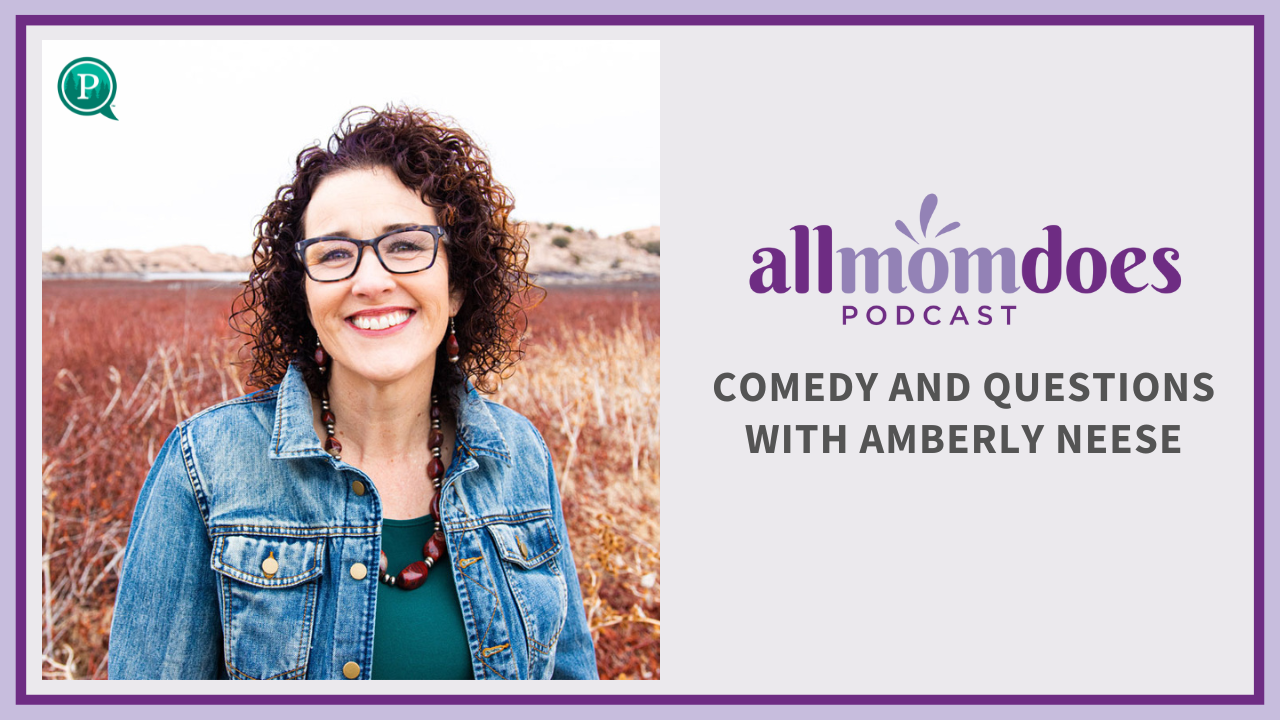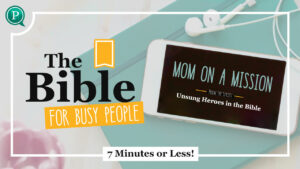Do you feel like you’re supposed to have all the answers when it comes to your faith? What if, instead, questions are supposed to be part of the deal? Comedian and author Amberly Neese sits down with The AllMomDoes Podcast host Julie Lyles Carr to talk about her approach to comedy, what’s she’s noticed now that she’s back to touring after Covid, and why we often get it wrong when it comes to understanding how Jesus taught and modeled faith.
Special thanks to the King County Library System for sponsoring the AllMomDoes Podcast!
Show Notes:
Find Amberly: Online | Instagram | Facebook | Vimeo
- Free ebook: 50 Ways to Initiate Great Connections with Others
- Bible Study: Untangling Faith, Reclaiming Hope in the Questions Jesus Asked
Find Julie: Online | Instagram | Facebook | Twitter | Pinterest
AllMomDoes: Instagram | Facebook | Twitter
Transcription:
Julie Lyles Carr:
Listen, if you want to know the way to my heart, be funny. And if you really want to know the way to my heart, be funny, and every time you text me or we chat, start off by calling me beauty. Like that combo is so powerful for me, and that is what my friend Amberly Neese brings to the table. Amberly, I’m so excited to have time with you today.
Amberly Neese:
Me too. And I’m so glad that I have friends who can be equally shallow with me. Just call me beautiful and we’ll be friends forever. I love that. I’m so thankful. Now you are not a shallow person, but once in a while, being called beauty is a thing. But you live it, girl. You are. You’re bourgeois. End of discussion.
Julie Lyles Carr:
My friend. Oh man. Well, Amberly has been on the podcast before and we’ll get a link to that previous episode in the show notes for you that Rebecca does, but I couldn’t wait to have her back on. We just get to catch up every now and then. I really thought that we would’ve seen each other by now. We’ve been in a habit of being able to see each other about once a year, and it’s been way too long. Amberly is based out of Arizona and I’m here in Austin, Texas. So sometimes our paths get to cross and sometimes they don’t. But Amberly, I am super excited about you being on today. Thanks for being here.
Amberly Neese:
My pleasure. I couldn’t wait seriously. Coffee cup in hand. Full heart. I’m ready. Let’s rock this.
Julie Lyles Carr:
Okay. Full coffee cup, full heart. Let’s do this.
Amberly Neese:
That’s right.
Julie Lyles Carr:
I actually really do want to start with a conversation about comedy because Amberly is wildly wickedly, hilariously funny. And Jen Fulweiler’s a good friend of mine, she’s also a comedian and gets to do things on the road. And there is just a bond I have with people who can do that, who can just get up in front of a room and truly traffic in making people laugh. So when did you realize that you were funny?
Amberly Neese:
So wow, this is going to get-
Julie Lyles Carr:
No pressure.
Amberly Neese:
It’s going to get real quick. So I was always talkative and a storyteller. Again, I’ve said I’m part Italian, I’m a part Italian and a Texan. So DNA is full of storytelling prowess. It’s our cultures. It’s the way we do things. But very early on I realized that I had a responsibility in my family. We had some pretty serious things going on and it was my job to bring the levity. And so very early on, even though my dad had a great sense of humor, he was very super dry. My son has that same puns and that kind of dry, super cerebral sense of humor, but I was goofy and silly and loved having people laugh, but especially when things were really tense in my home of origin. So it was a coping mechanism that God has used for his glory. And that’s all I’m going to say to that. But early, seriously early.
Julie Lyles Carr:
I bet. And you’re right. Comedy is a coping mechanism of sorts. I think it’s a superpower. I think it is the sign of a really keen intellect, particularly the type of comedy that you do. And for a lot of us who are always looking for the laugh, it can be a diversionary tactic. It can be a way of denying some things that are going on. It can be a way of masking some feelings. How do you try to traffic in a lane that keeps you funny but doesn’t have you off in the ditch really in your inner life? How do you make what’s going on in your own heart and then in the hilarious things you say actually match? Because that’s where I see people get into trouble. They’re hilarious in terms of from outward, but that’s not always a signal of what’s really going on. How do you manage that?
Amberly Neese:
First of all, Michelle Cashatt, years ago I heard her talking about speaking out of our wounds versus speaking out of our scars. And she said it’s not savvy. It’s not good stewardship to tell stories of pain that are still so fresh that they’re wounds, but that God can use scars to our stories of scars to really point people to him. And I feel that same way about comedy. There are times that I don’t tell a joke about my husband not picking up his socks because 12 hours before my husband and I had delightful exchange of loud words at each other because he couldn’t pick up his socks. It’s too soon, too close.
Julie Lyles Carr:
Too soon, too soon.
Amberly Neese:
And so to go from there. But I think it’s like honestly any creative outlet, whether that’s graphic design or podcasting or any creative art where that life imitating art thing and art imitating life, I think it is such a glorious way for us to file things in the right way. And again, a graphic designer may do that differently. A painter might add rich dark tones when they’re on the struggle bus, but I can do the same thing in comedy. It’s a great way for me to process the things that I’m going through, good and bad, beautiful and ugly, and work those things through because sharing those with others I feel like is our responsibility as Christians sharing our story. I just get to do it from stage and make funny hand gestures and choreography of silly as I go along.
And so that’s really what it’s like. I had the opportunity to see the last time you and I laid eyes on each other. First of all, I felt like you have no idea how special that made me feel that you took the time to do that. And I loved introducing you to my tour mates, Leland Clawson, who’s a brilliant comedian, and Johnny Diaz, who is just an amazing Christian recording artist. He’s fantastic. But we tour the nation and we get to talk to people all over the country. And because we’ve laughed together, actually Johnny the musician, is probably the funniest of all of us. He’s wickedly funny, but because we’ve laughed together, we have so many couples who come after the show and say, we haven’t laughed together in I can’t even tell you how long and laughter is such a yes, it’s a coping mechanism, but it is also a wall breaker downer. So that’s not a word, but I just made it up. And since you’re a Texan, George W made up a lot of words. So as a Texan, I feel it’s our responsibility to continue that.
Julie Lyles Carr:
A wall breaker downer.
Amberly Neese:
Yes. Wall breaker downer.
Julie Lyles Carr:
Love it.
Amberly Neese:
It is a wall breaker downer, and it has medicinal properties, laughter’s good medicine. So that’s how it is. So I just get to share my stuff with people and they can’t charge me for therapy. They actually pay me. So it’s a glorious, it’s fantastic. Praise the Lord.
Julie Lyles Carr:
Yeah, absolutely. Absolutely. I’m curious to hear what your process for developing your messaging is because having had a little bit of front row seat with some other friends who are also comedians, the breadth of how people put together there is that natural place of being funny. But I also know people who are very funny and are making their living doing comedy who are very introverted. And one of my friends actually spreadsheets out all of her bits, and then she actually brings a little recorder that shows her where the laughs were the loudest, where they weren’t quite what she expected and she charts it all out in order to be able to really be intentional about how to do this.
Now the flip side is I also have friends who are completely off the cuff, and I’m not saying it’s total improv, but there’s a general outline and then they just are able to insert these things. Anita Renfro is one of those. Michael Jr writes a lot of his stuff, but then he also is testing it. I’m just curious to hear where are you in all of that inspiration? Because there’s a lot to be said for being in the live room, and there’s a lot to be said for testing material and making sure it works before you get up there and they stick a microphone in your hand.
Amberly Neese:
So I think my teaching all those years that I’ve been a teacher I think have shaped this. So it starts with a Google. I have a Google doc actually. It’s a Google sheet that I will write down an idea and then I will add to that in the columns to follow. But I am not as meticulous and structured. I don’t use the same kind of strategy that your friend does that is super left-brained is probably super left-brained smarty pants person who takes all those, that bits of information and they come up with a formula and statistics. I 100% it is experiment as you go. So I don’t do everything off the cuff. And in fact, most people who do stuff off the cuff have practiced that off the cuff for a long time. The people that do improv comedy, it is years to hone the skills and the muscles to seem totally and completely organic. It’s like, no, you put in your 10,000 hours. It’s not completely organic.
I also feel like yes, the stage is a great place to gauge, but so is the book table because after a show I will consistently have people like, oh my gosh, you know what my favorite part, this was so funny. We can so relate to that. And I go, ding. And even though I don’t write it down like, oh my gosh, this is so relatable. I think this is striking the chord. I could probably swim in that pool a little bit longer, the next show, and I give it a go. And sometimes it works. Sometimes it’s fantastic. Sometimes I’m rewarded for that and sometimes I’m like, and the number you’ve reached has been changed and the show after that also I just pivot just like you do in teaching and mothering and human being, you pivot for sure.
Julie Lyles Carr:
Well, and you’re so right. Even with our kids, the very thing that worked really well to guide this kid falls really flat with that one. And so we’re always having to test our material whether we’re trafficking in comedy or in mothering, there is always that material that has to be tested out.
Amberly Neese:
My mom says she remembers very distinctly the day that my sister, she’s giving my sister a talking to and for me as a firstborn and a pleaser, that’s all you had to do is a good talking to, I would punish myself hours later. So she’s on part two of a three-part mother sermon and let my sister have it and my sister says, okay, this is great, but am I getting a spanking or not?
Julie Lyles Carr:
Yeah. Can we just cut to the chase?
Amberly Neese:
Okay. All right. [inaudible 00:11:02].
Julie Lyles Carr:
I just need to know.
Amberly Neese:
Exactly.
Julie Lyles Carr:
I love that. I love that. Now you and I got to meet because one of my books and your books are with a particular publisher, and we just had a really lovely experience with that particular publisher and had an opportunity to do workshop together and speak together. And then I got to come by as Covid was beginning to taper and you were getting back out on the road. You had a tour date through Austin that you do with the two guys that you mentioned before. Because you guys do a lot of marriage kind of events, which I love. It’s very specific in that lane. Of course you do other speaking and writing as well, but in this particular lane, this approach of it with comedy, with music and with of course your incredible heartfeltness in what you have to say.
Amberly Neese:
Thank you.
Julie Lyles Carr:
When it comes to your faith and your relationship with God, what are you seeing out on the road now? Because now you’ve probably been back out there about a year, year and a half, you’ve had a little more time back out on the road. What are you seeing that feels different maybe than it did prior to all the amazing events of 2020? What are you noticing in marriages today?
Amberly Neese:
This is probably not going to shock you, but I feel like Covid was a magnifying glass of sorts. And as we all know, if you give a small child a magnifying glass, they will decimate every bug within a 20 mile radius with the sun.
Julie Lyles Carr:
The ants are dead.
Amberly Neese:
Magnifying glasses can be used for evil, but it also could be used for good. It helps you see some of those areas in which you still have work to do. And in our touring, what we’re finding is, first of all, people are more thankful for the time together. They have this newfound gratitude for the ability to just be together, laugh together, be in a larger building, share community, all that kind of stuff. But there is still this pervasive loneliness, and you and I have talked about this because it breaks our hearts, but before Covid happened in January of 2020, 61% of Americans admitted to being lonely. And that did not, just because you’re a Christian didn’t negate those findings. Just because you were married did not negate those findings.
So what we’re finding is that people are more in touch with the fact that they might be in a relationship and a marriage and doing the best they can, but there’s still this underlying loneliness and disconnection that we are still in that epidemic for sure of loneliness. And so that’s what we’re finding and that’s why we are so committed to continuing that tour because we feel like, man, if all this night is an opportunity for two people to get together and see that community can be powerful and to laugh together, then maybe that will be the discussion starter that says, how do we get to the bottom of this disconnection between us and between the two of us and our community?
Julie Lyles Carr:
Right. It is wild because for a lot of us, we may have spent more time with our spouse than we’d spent with our spouse in a really long time. And yet we were seeing spin out that I don’t think anybody could have predicted. Are you finding that when you’re touring, what are some of the comments that people are making when they come up to you at the book table after the event that you’re finding surprising that maybe you didn’t expect?
Amberly Neese:
That’s a good question. Well, first of all, we watched divorce rates skyrocket and child abuse skyrocket and starvation of families like hungry families go up. There was a lot of stress during Covid on the family and on the relationship and people losing their jobs and all sorts of other stuff. What we’re finding is a hunger for something greater. And that’s exciting to me. People have left that. And I think some of it is our kids and grandkids, our kids, we want better for them. The generation right before me, we wanted better for our kids. So we gave them everything. I think this next generation is so savvy in, they’ve seen it all. They’ve done it all. They’ve TikToked it, they’ve made dances out of it, they’ve done whatever. What they need is real, real connection. That’s what they’re really hungry for. And so I think that’s the deal. I think honestly, if I was asked to speak at a church planting or a church growth conference, all I would talk about is if we as the church and I’m bringing it, I’m so sorry if I’m getting so serious.
You said I was a comedian and here I’m getting all serious. If we would go back to living like the Acts Two church where we did everything together, we loved each other well, our sharing and our worship and our crazy commitment to one another brought people to Christ. I think that’s why revival is happening, people are hungry and I think they’re ready for something better, something deeper, something more significant than what we found. So I’m actually super excited. I’m so sorry that we lost people in Covid. I’m so sorry for the businesses that were victims of war and the families and like I said, the loss of life. But I think this newfound commitment to doing more than just checking the boxes of life, I think is a big deal.
And it’s one of the reasons that I wanted to write the new Bible study that I did is because in that wanting more, there are a lot of people that are looking to faith and there are a lot of people that are turning away from faith because they want to explore the big bad world of possibilities. And I just wanted to offer hope to people and that’s where it came out of honestly.
Julie Lyles Carr: Some of my very favorite summer memories are when I would go to the library during the summer as a kid and I would just sit myself down in front of an aisle and just pull book after book after book, doing all kinds of reading and dreaming and researching. And that is something I still carry with me to this day. There’s just something about getting into the library and taking some time to peruse the aisles, look at different things, let my mind go in different directions. And guess what? That’s what we want you to do with the King County Library System because this summer there’s a summer reading program for all ages. You can earn prizes for reading, you can enjoy different programs and activities at the library all summer long. This free summer reading program is open to children, teens, and adults. And here’s the goal. Your goal is to read 20 minutes per day or you can set your own reading goal if you want, through August 31st. Any kind of reading counts.
So this includes reading to someone else out loud or listening to an audio book or taking that little summer read to the pool while you play in the sunshine. So be sure and visit your community library to pick up a reading challenge log or go to kcls.org/summer. That’s kcls.org/summer to get started. So book it, see what I did there, to your King County Library System and be sure and sign up for the summer reading program. I love the title of this study. Untangled. And it goes through this idea that is very true. And yet we miss sometimes. I think sometimes in our faith walks, we think faith is about having everything buttoned down. We know if it’s a multiple choice test, we know exactly what to select. We are going to send our spiritual Scantron through the machine and we’re going to come up aces because we really have got it figured out. And yet I think the events of the last few years and that drumbeat, honestly, I think, Amberly, was already there.
Julie Lyles Carr:
To your point, I think the magnifying glass of what we’ve experienced over the last three years is that the questions that were already there, the restlessness that was already there, the dissatisfaction that was already there, we had to then sit and stare at it because we got still enough to have to do it. We come out the other side and I hope there is a fresh appreciation for the fact that it is okay to have questions. That Jesus asked all kinds of questions, which is exactly the point of the study where you unpack a lot of the questions that Jesus had that allows us to have questions. And he often answered questions with questions.
Amberly Neese:
Yes he did. Brilliant.
Julie Lyles Carr:
This notion of we’ve got it all on lockdown, we’ve got it all figured out, isn’t even emblematic of how Jesus taught, how he led, how he modeled what our faith journey was supposed to be like. So talk me through the impetus that you had for taking a look at things through this lens, untangling the various questions and the questions that Jesus answers with questions as you looked at scripture. Where did this start?
Amberly Neese:
Yeah. Well, you are a spiritual smartie. So you know this, I went to Bible college, I got a master’s degree from a Bible college, but I never recognized until the Holy Spirit hyped my awareness that really Jesus rarely answered a question full on. He answered with questions. You were right. Over 300 questions in the New Testament, and he really only answered two. Flat out answered. We do this all the time as moms, when the kids were small, we’re hungry. And I would say, have I ever let you starve? I wouldn’t say I’ve got snacks in the back. I would always, well, you know who I learned that from was Jesus. He often asked his disciples questions in response to their questions. So if we are going to be more like Jesus, if that is the goal, you and I and all of our friends listening, if that’s our goal to be more like Jesus, well then why don’t we respond to things as Jesus did with curiosity and helping people get to the bottom of things?
I did not grow up in a Christian home, so I was not sold the bill of goods that you’re not supposed to ask questions. But my husband, absolutely, his faith history essentially sit down and shut up in Jesus’ name. When it comes to spiritual things, you just swallow it hole, as you said, the spiritual Scantron where everything is buttoned down. But if we’re going to be like Jesus, let’s approach things like Jesus does. And yes, we have a lot of friends, family, kids, spouses, neighbors deconstructing their faith, which is such a hard term for me. The original title of the book was not Untangling Faith. It was literally Reconstructing Faith. And the publisher said too soon.
Julie Lyles Carr:
Too hot a topic.
Amberly Neese:
Too close, too whatever. And I don’t blame him. So we essentially talked that through. So I started the study, felt like the Lord was behooving me to write this. And then as I was getting deeper into it, looking at these questions, I realized, wait, I have some questions of my own Miss I have a master’s degree from a Bible college. I’ve written Bible study. I’m the one that should be the queen of the spiritual Scantron. And here I am going, okay, I say that God is real. I say that he is good, I say that, but when I lose my job, do I really live that? And the answer was no. I was too busy feeling sorry for myself and freaking out.
Julie Lyles Carr:
Panicking.
Amberly Neese:
So I realized that I too had some faith that I needed to untangle not in a bad way, God is not offended or he doesn’t feel threatened by our questions. He sent his son to die on the cross, but also to set a perfect example for us in his 33 years. And one of those examples was the willingness to ask questions. And to get to the heart of-
Julie Lyles Carr:
And why we’re so scared of that approach is so fascinating to me. But it’s there. It’s everywhere. When you start looking for it in the New Testament, you’re going to see it everywhere. Now, let me ask you this. One of the visuals in my mind when I think about untangling faith is both the visual of a necklace that you’re traveling with and it gets in the bottom of your carry on and it ends up in eight million little knots, and you’re having to do the little fire starter maneuver with your hands trying to get it all untangled.
Amberly Neese:
I do a safety maneuver. But yes, the fire starter’s a good one.
Julie Lyles Carr:
Yes. Okay. But there’s also this place too, and I’m thinking now of visual of a meme I’ve seen where little girl is playing in the bedroom with her siblings and she comes out and her siblings have gotten goo that all the things that the kids love to play with, the gel stuff. They’ve gotten that all in her hair and the mom trying to untangle out of all of that. So I think we have a couple different things we’re trying to untangle. There’s our places where our faith folds over on itself, and we just get more questions because we ask a question and that leads us to ask another question.
There’s also the place where some extraneous material gets folded in and sometimes it gets folded in from the church, sometimes it gets folded in from a well-meaning mentor or Bible teacher. Sometimes it gets folded in from the world. How are you going about teasing all that apart to really figure out, this is part and parcel of my faith that I just need to sort it out a little more, or this actually needs a deep dive cleanse because I’ve got stuff in here that wasn’t meant to be here anyway?
Amberly Neese:
First of all, I’m so glad you asked this question, but what’s interesting is when I started writing this book and I was asking the Lord for wisdom of who the target audience would be, I had in my mind the lost or the struggle bussing Christian who never really dove in head first, just waded into the waters, but didn’t really swim ever. And what I found is when people are doing this study, the people I hear from are the people who have major church hurt, a church broke their heart, added that goop to their spiritual hair that they’re having a hard time getting out of. And the truth is, I am so proud of people who are willing to be brave to sit through that goop. You have a zip code of children, you probably have dealt with your fair share of the goop, but think about how we do that. If a child came to you with goop, Julie, tell me what you would do to get that out. Walk me. No, I’m asking you. Walk me through the steps.
Julie Lyles Carr:
In that case, the tendency is to want to find the perpetrator first. That’s usually who did this to you? And my brain’s finally catching up. I’m talking about slime. Have you had your kids have slime? It ends up in your carpet, it ends up everywhere.
Amberly Neese:
Absolutely.
Julie Lyles Carr:
Let’s pretend like this is slime, sparkle slime that your kids have gotten in their hair. But what begins to happen in that case or when we’ve had gum or we’ve had whatever get caught in a kid’s hair is you try the comb through process. This is part of where you’re trying to break it down at the very ends and then go back in. Sometimes you have to add something. You need a little conditioner in there to try to ease this process. The final step-
Amberly Neese:
You do know that you’re literally just walking through the process of untangling faith in such a brilliant way. You don’t even have the book yet, and yet you don’t need it. You’re right. So you calmly comb through and you figure out what’s there. You assess. Then you might have to add something to help the process, which hopefully is more of God’s word and more community and more strong biblical based wisdom. All right, keep going. What else do you do?
Julie Lyles Carr:
Then it takes time. You just got to have the patience because the harder you yank, the more it will get itself secured. And so the willingness to see progress where progress is being made, and then honestly, and unfortunately this occasionally happens, sometimes you got to get out the scissors. It’s not going to come out without cutting it off. And all of the nuance, all of the gentleness, all of the trying to work it out, it’s going to require truly a fresh cut to actually be able to get loose.
Amberly Neese:
What I found as I did this study is I was holding onto cultural and practice tenets like they were scripture, and I realized some of that needed to stay, but some of that was spiritual slime with no sprinkles in it, just no sparkles just getting in my way of figuring out the truth. And so that was, I’m just going to say it sounded super easy. I just put it in one sentence. Oh my gosh, I recognize that I did the-
Julie Lyles Carr:
I just did this.
Amberly Neese:
It was hard. But the other thing is, if a child came to you like that, you would gently do that process. And I think we don’t always give ourselves permission to grapple with spiritual things gently. We get frustrated at ourselves because we don’t move fast enough or we get frustrated with ourselves because we’re like, he’s been so good. I don’t know why I’m having this problem. But to give grace, to extend grace to that child, as you’re working through that thing, we need to do the same thing with ourselves. And so that’s why I’m excited. I want to tell you about it’s a six week study, and these are the big questions. These are the big life questions that we unpack, not with my answers, but with the questions that Jesus asked, which is, can I trust God? How can I grow in my faith? Why should I pray? What must I do to be healed? What’s God’s plan for us? And what does it mean to follow God? So those are the big questions.
Julie Lyles Carr:
Great questions.
Amberly Neese:
That we actually unpack using the comb of these questions. See, we’re just going to lay on this analogy as long as-
Julie Lyles Carr:
We’re going to park in here.
Amberly Neese:
Yes. I like it. I like it. I just did a change of address form. It’s awesome. Loving it.
Julie Lyles Carr:
I love it.
Amberly Neese:
That’s it. I co-sign on that analogy. I think that’s great.
Julie Lyles Carr:
Amberly, I think at times it is easy for us to perhaps be a little more gentle the younger our kids are. So if our child comes to us with a question about God and we just think, well, they don’t know, and so let me walk them through this, or why did this happen? Or why did my pet hamster die? And we have these ways that we can talk to children when they’re younger because we feel like we’re still nurturing and growing them in their faith. But you and I were chatting before we got on mic about what both of us are seeing a lot of which is when those kiddos are maybe getting ready to launch or they have launched and there seems to be this, I don’t even know that these kids would call it a crisis of faith. I think they would just say, I’m just done with this.
This hasn’t really, I’ve got a church hurt. I had somebody say something rude to me when I was in youth group. I had somebody question me on this, that or the other, and I’m just done with this judgy thing. I’m out of here. At that point how do we begin to still engage in the same way with patience? There’s something that feels more urgent I think when our kids are reaching those launching stages that if they start coming to us with questions or they start coming to us with diatribes, or they start coming to us with what feels like a lot of disinterest in the thing that we’ve invested so much time in their upbringing, how do we stay in a posture of patience with that and let God do the work he’s going to do?
Amberly Neese:
Man, that’s a question, isn’t it? I think part of it is, yes, there is more gravity when they’re older. The stakes are higher. My stepdad, when I was like 14, said to me, it’s not that I don’t want you to make mistakes, I just don’t want you to make mistakes that will disallow future opportunities, which I thought was a really wise way to say that.
Julie Lyles Carr:
Brilliant statement.
Amberly Neese:
So allowing them the space to figure things out I think is great. Picture them like the kid with the goop only when we’re close. So if you are having, oftentimes that disconnection from God brings a disconnection in your relationship, don’t yell, bring me the calm. You need to make sure there’s proximity so you stay in their space and you love on them and God’s kindness leads to our repentance. So practicing kindness with our own kids, even when they’re being Turkey lips, even when they’re being difficult, even when they’re struggling, even when their stuff becomes our stuff. So I think some of that is just proximity, and I think some of it can be found in the questions of Jesus. Ask your kids questions. I think that’s been the hardest. I’m sure you can do this. You can tell me this. Nobody told me.
Nobody told me. They told me how hard it was to have the terrible twos and infants and no sleep. Nobody said, buckle up. The hardest part of parenting is after they leave the house. And here’s the deal, my kids aren’t even whack-a-moles, they are not making poor choices and shoplifting and doing drugs. They’re not doing any of that stuff. And it’s been the hardest thing for me. Why? Because I’ve had to go. I’ve had to transition from answer giver to wait for the answer Mom. I’ve had to ask more questions and give less of my awesome wisdom. I’m ready to lay it. I’ve got plenty. But that’s been a really hard transition. And when our kids are struggling spiritually, it feels really frantic. It feels really immediate. And yet you would never have done that as a child getting that stuff out of their hair.
And I think we just need to picture those kids, even if they’re 27, like that little kid saying, I need to have proximity and I need to have patience with them, and I need to ask probing questions. That’s the deal. And not in an attacking way, but like, hey, do you feel like you’re really happy? Do you feel like this is the path to what’s going to make your heart sing longterm? Are you feeling connected to other people? Do you have good community? What does that look like to you? Asking those good questions, which is questions Jesus asked.
Julie Lyles Carr:
Absolutely.
Amberly Neese:
Figuring that out, which sounds like a Bible study answer, but do the homework. Figure out the questions Jesus asked. In my study with six weeks, so we only explored 30 questions, but that’s a 10th of what he actually asked.
Julie Lyles Carr:
A 10th. Man. The math there is just absolutely fascinating.
Amberly Neese:
I know. So do the research and then do the best you can to live that out with your kids, helping them untangle that mess themselves.
Julie Lyles Carr:
Yeah, whatever the age and stage that is such great wisdom. All right. Well, the Bible study is called Untangling Faith, Reclaiming Hope in the Questions Jesus Asked, Amberly Neese is my amazing friend. You can also find her on tour doing all kinds of stuff. Amberly, where do you want the listener to go to be able to interact with you and see all that you’re up to?
Amberly Neese:
Yeah, I would love for them to come to amberlyneese.com. If they sign up for my monthly newsletter, they will get a free gift, an ebook called 50 Ways to Initiate Great Connections with Others, and they’ll get a monthly newsletter that gives my favorite recipes. By the way, I just gave my last newsletter had a black eyed pea salsa recipe that makes you want to pass the offering plate. My Texas mother’s always like, everything’s better with black eyed peas. So I found the salsa recipe, and I’m telling you that was in my last newsletter, but I just send encouragement and ask people how I can be praying for them. So I would love for people to connect with me there.
Julie Lyles Carr:
So fantastic. So be sure and check out Amberly, and we’ll have Rebecca get that into the show notes, all the links where you can find her. I love to connect with you too at Julie Lyles Carr on Instagram and all the places, and also julielylescarr.com. Be sure and check out AllMomDoes on the socials online because this is a great place to hear the questions that other women are asking, the things that they’re grappling with in their marriages, with their kids and their faith walk and their work. And you will find such support and such love there. So be sure and check out AllMomDoes as a community and share this episode. When you like and share episodes it really does help us get the word out. I’ll see you next time on the AllMomDoes podcast.








